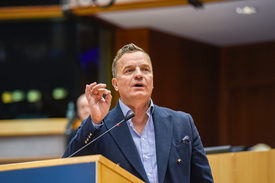MEP Georg Mayer spoke to us about the FPÖ's landslide victory in Styria
Fidesz ally ready to lead Austria
The Austrian Freedom Party (FPÖ), an ally of Fidesz, scored a huge success in the Styrian provincial elections on 24 November. We asked Georg Mayer, FPÖ MEP from Styria, about the reasons for this success and even its consequences for national politics.
In Styria, the FPÖ achieved an outstanding result of 35 percent, the People’s Party (ÖVP) and the Greens suffered significant losses, while the social democratic SPÖ more or less maintained its support. How would you explain this result?
This result reflects a clear shift in the priorities and frustrations of the Styrian people. For years, the governing ÖVP and SPÖ coalition has failed to address the pressing issues facing our citizens—rising living costs, a strained healthcare system, and uncontrolled immigration. The Greens, meanwhile, have focused on ideological projects that resonate with a limited portion of the electorate, rather than tackling practical challenges. The FPÖ under the leadership of Mario Kunasek has succeeded because we have listened to the people. We brought solutions to the table that address their everyday concerns. Styrians are tired of symbolic politics and bureaucratic gridlock. They want politicians who will take bold steps to protect their safety, sovereignty, and economic well-being. Our strong message against illegal immigration and for affordability, regional investment, and robust healthcare resonated deeply, earning us the trust of the voters.
What do you expect from coalition building in Styria?
Mario Kunasek and the FPÖ have emerged as the clear choice of the Styrian electorate, and this result should be respected in coalition negotiations. We are open to forming partnerships that prioritize the needs of the people, but we will not compromise on our core principles. Any coalition agreement must include concrete commitments on border security, cost-of-living measures, and investment in local healthcare systems. Styrians have sent a strong signal that they want change, and we expect our potential partners to understand that this is not the time for politics as usual. The days of backroom deals that disregard voters’ priorities are over.
What are the main topics of the FPÖ in Styria?
Our agenda in Styria is centered on the real concerns of the people—issues that affect their daily lives. Let me highlight the main priorities, that where communicated from Mario Kunasek and his Team. First and foremost is migration and border security. People are frustrated with the lack of control over illegal immigration, and they see its impact on our social systems and communities. The FPÖ is the only party that stands unequivocally for strict immigration policies and prioritizing Austrians in housing, jobs, and social benefits. Next, cost of living is a huge concern. Inflation has hit everyone hard, and the government has done too little, too late. We propose practical measures: lowering taxes on energy, implementing price controls on essential goods, and supporting Austrian families directly. On healthcare, we’re addressing the glaring gaps in rural areas, where people struggle to access basic medical services. We strongly oppose centralization efforts like the „Leitspital” project in Liezen, which has been rejected by the local population. Healthcare should be local, accessible, and efficient. We’re also prioritizing infrastructure and transportation. Styrians want better roads, efficient public transport, and practical solutions that reduce commute times. Unlike the Greens, who focus on ideological restrictions, we want investments that benefit local businesses and families.
What message does this result send to Vienna? Can there be consequences outside Styria too?
The Styrian election is a turning point, not just for Styria but for Austrian politics as a whole. Under the leadership of Mario Kunasek, the FPÖ achieved an outstanding result of 35%—a historic victory that positions him as a strong contender to become the second-ever FPÖ governor in Austria’s history. This result reflects the deep trust that Styrians place in our solutions to the real problems they face, and it sets the stage for transformative political change in the region. The implications for Vienna are undeniable. Herbert Kickl’s recent federal election success, combined with Kunasek’s victory, shows that the FPÖ has the momentum and public backing to lead Austria in a new direction. However, as we saw with President Van der Bellen’s refusal to grant Kickl the mandate to form a government despite his strong results, the political establishment is doing everything it can to resist this shift. On a federal level, the picture is chaotic. The SPÖ continues its path of self-destruction, with figures like Rudi Fussi openly trying to oust Andreas Babler, deepening the party’s internal crisis. Meanwhile, Chancellor Nehammer’s position within the ÖVP looks increasingly fragile, as his party is losing its base while he struggles to maintain authority. The NEOS, meanwhile, find themselves in an unusual position of power. Without them, forming a stable government is nearly impossible. But the NEOS have shown a willingness to abandon their principles to secure a place in any coalition, making it likely they will compromise heavily just to stay relevant. This could lead to a weak and unprincipled federal government that fails to address the challenges Austria is facing. Mario Kunasek’s victory sends a clear message: Austrians want strong, decisive leadership that prioritizes their interests, not more of the same failed policies from Vienna. The Styrian result shows that the FPÖ is ready to deliver that leadership, not only regionally but nationally. It’s a signal that change is no longer just an option—it’s a necessity.

